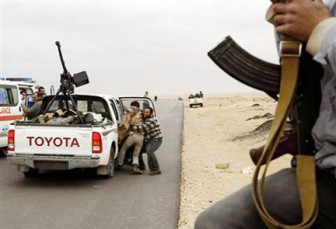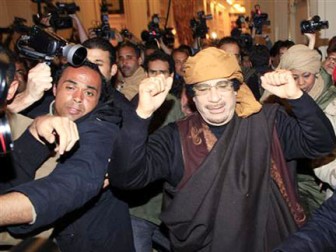WASHINGTON, (Reuters) – U.S. President Barack Obama and British Prime Minister David Cameron discussed a potential no-fly zone for Libya yesterday, but both countries insisted that any intervention must have broad international support.
As Obama faces growing calls at home to help Libyan rebels seeking to end Muammar Gaddafi’s 41-year rule, he and Cameron discussed a “full spectrum of possible responses” during their telephone call, the White House said in a statement.
Forces loyal to Gaddafi attacked rebels with rockets, tanks and planes in western and eastern Libya, intensifying efforts to crush the revolt and raising pressure on foreign governments to avert a humanitarian crisis in the oil-producing North African country.

Britain and France are working on a U.N. Security Council resolution for a no-fly zone that could be put forward if they think conditions warrant it and NATO defense ministers will meet tomorrow and Friday to examine options over Libya.
U.S. Secretary of State Hillary Clinton, repeating Washington’s call for consensus, said it was up to the United Nations to decide whether there should be a no-fly zone.
“I think it’s very important that this not be a U.S.-led effort because this comes from the people of Libya themselves,” she told Britain’s Sky News. “This doesn’t come from the outside, this doesn’t come from some Western power or some Gulf country saying ‘This is what you should do’.”
The U.N. Security Council authorized a no-fly zone over Bosnia in 1993-1995 to curb Serbian and Croatian air power. The United States and Britain enforced a zone over Iraq after its 1990-91 invasion of Kuwait but without explicit authorization.

Clinton’s comments about a no-fly zone for Libya echoed those of British Foreign Secretary William Hague, who said it was a practical possibility but would require “a clear legal basis, a demonstrable need and strong international support and broad support in the region.”
CRITICISM AND SKEPTICISM
Obama and Cameron will work on planning for several options for Libya, including surveillance with spy planes, humanitarian aid, enforcement of a U.N. arms embargo and a no-fly zone.
“They agreed that the common objective in Libya must be an immediate end to brutality and violence; the departure of Gaddafi from power as quickly as possible; and a transition that meets the Libyan peoples’ aspirations for freedom,” the White House said.
Cameron told the BBC that planning was needed in case Gaddafi refused to step down.
“I think now we have got to prepare for what we might have to do if he goes on brutalizing his own people,” he said.
While Obama faces criticism he is being too cautious over the turmoil in Libya, his administration is reluctant to get drawn into the conflict while U.S. troops are entangled in Iraq and Afghanistan and the motivations of the fragmented rebel groups are far from clear.
That caution was shared by Republican Senator Richard Lugar, an influential voice on foreign policy, who strongly warned against any U.S. military intervention in Libya, even to set up a no-fly zone.
“Who is it we want to help?” Lugar asked in a statement, saying the United States did not really know who was fighting for or against Gaddafi, intervention could create anti-American fervor in the region and Congress would have to declare war.
Democratic Senator John Kerry, a close Obama ally, has called for the United States to prepare for a no-fly zone and has floated the idea of bombing Libyan runways to ground Gaddafi’s warplanes.
But U.S. officials have voiced concerns about how effective such steps would be against Gaddafi’s forces, which are relying more on helicopters than planes to attack from the air.
General James Amos, head of the Marines, said Libyan ground forces were a significant factor in a “very complex” situation.
Admiral Gary Roughead, chief of Naval Operations, said there were questions about a potential no-fly zone, including which NATO countries might participate.
What are the restrictions on use of force? Where are the basing and the access that might be required?” he said.





